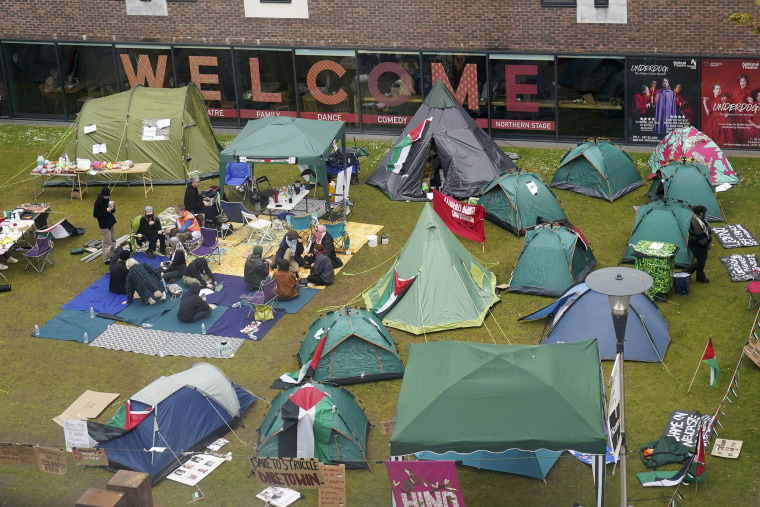‘We really felt inspired’
A growing number of protests have also been launched on campuses in the United Kingdom.
“I think we felt really inspired seeing Columbia and just all the universities cropping up with the encampments,” Ella Ward, a 21-year-old environmental science student at the University of Leeds in northern England, said in a phone interview Friday.
Around 50 students at Leeds launched their own encampment Wednesday, according to Ward, a representative of Youth Demand, a student-led group calling for a two-way arms embargo on Israel. She said she did not play an active role in organizing the demonstration, but supported the initiative and hoped to see it grow.
“I think Palestine has woken a lot of us up,” she said. And seeing students in the U.S. continue to hold mass demonstrations, despite thousands of people facing arrest and suspension from their schools, “it’s so important,” she said.
Ward said that as of Friday, university administrators at Leeds had not “condemned or condoned” the students’ encampment.
The University of Leeds did not respond to a request for comment from NBC News.
Several other universities in the U.K. have seen pro-Palestinian demonstrations crop up on campuses in recent days, according to photos and videos posted to social media, including University College London, the University of Warwick and Newcastle University.
A spokesperson for the University of Warwick said the protests were being “managed in line with our legal duty and commitment to allow freedom of speech on campus.”
University College London and Newcastle University did not respond to requests for comment from NBC News.

Some students feel silenced
Not all students are supportive of the protest action, with some expressing concerns for their safety and others complaining that the demonstrations have impeded their studies.
“While Jewish students remain resilient, encampments are growing on campus and increasing in hostility,” said Edward Isaacs, president of the Union of Jewish Students, which represents Jewish students in the United Kingdom and Ireland.
“Universities must have moral clarity in their leadership to ensure campuses are welcoming and inclusive to Jewish students,” he said in a statement on X.
Samuel Lejoyeux, who leads the Union of Jewish Students of France, noted that French student protests appeared more peaceful than those in the U.S.
“With the overwhelming majority of students at French universities, including Sciences Po, it is still possible to have a debate. I even think there is an increased hunger for debate,” he told the broadcaster BFM TV, according to Reuters.
Some protests in the U.S. have drawn accusations of antisemitism, which Jewish groups say has been on the rise in the midst of the Israel-Hamas war. Student protesters, who include Jewish participants, have rejected the accusation, with some saying claims of antisemitism are being weaponized against them in an effort to dismiss criticisms of Israel’s actions in Gaza.
Elisa Lin, a 21-year-old master’s degree student studying public policy at Sciences Po, said she is one of many students who feel caught in the middle of mounting tensions on campus.
“We feel like a few minorities on both sides of the protest, like pro-Palestinian and pro-Israel, kind of took away the mic and we as a silent majority can’t really say what we feel without being immediately bashed or insulted,” she said.
Earlier this week, she and other students launched an online petition calling for open dialogue between students and the university’s administration — as well as for demonstrators to stop blockading the school and for those who have “illegally” occupied buildings on campus to be reprimanded.
As of Friday, just over 1,170 people had signed the petition, launched Monday on Change.org.
“Of course, I do have my own convictions,” said Lin, who is from Paris. “I personally condemn the terrorist attack by the Hamas organization during the 7th of October. I very clearly condemn these attacks, but at the same time, I’m very strongly against the politics of Netanyahu in Israel,” she added.
Some 1,200 people were killed and 250 taken hostage in the Hamas-led attack, according to Israeli officials. More than 34,000 people have been killed in Gaza since Israel launched its operation in the wake of that attack, according to the Palestinian enclave’s Health Ministry.
Lin said that she and other students wanted to be able to continue their studies and speak freely about their beliefs without fearing retribution from their peers.
In Australia, hundreds of people took part in demonstrations at the University of Sydney, with tents set up including one emblazoned with the words: “Free Gaza.”
Tensions appeared to rise as demonstrators were confronted by a rally of pro-Israel supporters, Reuters reported.











